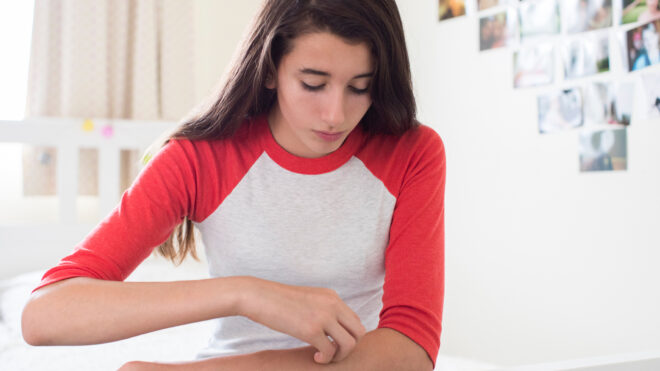
Sponsored by Incyte
CafeMom’s monthly column "Mom With" aims to redefine what it means to be a "normal" mother by focusing on how it feels to live with a mental disorder or other health condition. We see you, we hear you, and we're in this together.
After my daughter was born, I often laid her on my bed in front of me, forming my legs into a diamond shape border around her little body while I gazed at her as she wiggled and grinned. There were countless times I wanted nothing more than to hold her; however, because I have eczema, I often struggled with skin inflammation that caused me to itch intensely.
Eczema is a chronic condition that causes inflammation of the skin usually caused by an over-activation of the immune system; many times, this is because of allergens, stress and other environmental factors. Atopic dermatitis (AD) is the most common type of eczema, affecting more than 21 million people in the U.S. aged 12 years and older. It can manifest as persistent itchy skin, dry and scaly patches or red lesions on the body.
When looking down at my new baby, who was lying on the bed instead of nuzzling in my arms, tears would stream down my cheeks as I felt momentarily disconnected from her because of my unrelenting need to scratch during my eczema flare-ups. I felt like I didn’t have control of my body. In those moments, the memories of my struggle with the skin condition I’ve had since adolescence came rushing back. I remembered my classmates who teased me because my skin was dry and flaky, and I remembered instantly getting a rash after petting my friends’ furry pets. I desperately wished my child would not have the same condition.
Unfortunately, that is not the case. My daughter is also living with eczema. Now I not only cope with the condition myself, but I also help my daughter cope.
The stress eczema causes can be potent.
When I’m experiencing a flare-up, my skin itches and burns and I have visible red patches. During these spells, my thoughts are consumed by the need to itch, cover up my skin and wear long sleeves (even in 90-degree weather). Cleansing my body from the inside out becomes my primary focus. Nevertheless, in my 30-plus years of navigating this condition, I’ve learned that things like meditation, reading, binge-watching a show or coloring help keep me calm during a flare-up.
When my daughter has a flare-up, she feels the same irritation and anxiety as I do, but she’s still learning how to self-soothe. In these times, she looks to me to help her through the moments that feel like a state of emergency because she is scratching so intensely that she’s making herself bleed. When my daughter looks at me sobbing, I can’t help but feel her heavy burden and want to do everything I can to lift that weight.

In these moments, I have to stop feeling sorry for myself and kick into Supermom mode.
I use remedies that work for me to help my daughter push through her flare-ups, or what I call her ‘breakout period’. I’ll hold an ice pack or roll an ice roller over her inflamed areas, or I’ll run a washcloth under cold water and press it against her itchy spots. I have her sip on tea and drink lots of water for hydration. I make sure her skin is extra moisturized. We also do some deep breathing and I try to distract her by getting her to tell me a story about her day or telling her a story about mine. It usually takes a few days for a breakout to clear up, so I ensure she understands that she likely won’t feel better overnight.
So, what causes our flares?
Everyone with eczema has different environmental triggers that cause flares. It can happen if we eat or drink too much of the wrong thing, like soda or processed foods. If we catch a cold, it can manifest in a flare. If we use the wrong detergent, lotion or body wash, touch unsanded wood, allow grass to touch our skin, get too hot and sweaty, feel stressed out or wear anything other than 100% cotton (try finding 100% cotton socks — seriously, it’s impossible!). Life with eczema can be a constant game of dodging the variables that cause it and grappling with restrictions.
When living with eczema, many things, like embracing dietary changes, require discipline and the ability to look on the bright side.
When times are tough, it’s also about finding ways to go easy on yourself, knowing you are resilient, and recognizing that we are all different and all likely going through something. Just as I remind my daughter, I have to remind myself that I have resources and people who love me and that I am worthy of understanding, patience, acceptance and inclusion. Resources, like StartFromScratch.com, which has some great education, tips and seasonal fact sheets (like this one about fall’s effects on AD), are great allies in our continued fight to live with and manage eczema. I may not be able to do everything everyone else can, but I’m grateful for what I can do for my daughter and myself.
© 2023, Incyte Corporation. MAT-DRM-01005 09/23







